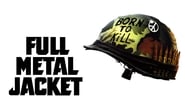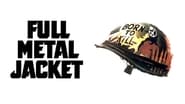adonis98-743-186503
A pragmatic U.S. Marine observes the dehumanizing effects the Vietnam War has on his fellow recruits from their brutal boot camp training to the bloody street fighting in Hue. Full Metal Jacket depicts War and the troubles that Marines go threw every day and with a talented director behind camera such as Stanley Kubrick the movie definitely brings on emotion but also war to it's purest form. As far as perfomances go i think all the actors did pretty good but Vincent D'Onofrio's Pvt. Pyle is the stand out perfomance of the film sure he has a small screen time but the man does a great job and the same goes for R. Lee Ermey, definitely a War movie that i can recommend easily for anyone.
Osmosis Iron
Vietnam war as depicted by the master itself: Stanley Kubrick. Funny moments, sad moments and everything in between. This movie shows the many aspects of war and it's effect on human condition. Many people seem to think it gets weaker after the boot camp and the second part isn't as good, I like the whole movie, the second half has at least the same amount of memorable scenes if not more!
SlyGuy21
I find it interesting that the first half of this is so fondly remembered compared to the second half. The first half has the famous role of R. Lee Ermey, a ton of quotable lines, and a dark sense of humor. This part of the film exposes both Joker, and the audience to the true horrors of war. It doesn't start in the field, it starts in the training. Similar to "A Clockwork Orange", the first half of this judges you, "Yeah, you like this out of shape guy getting physically and emotionally abused, don't ya?". We do, even though I knew what would happen, I laughed as Pvt. Pyle was humiliated for over 40 minutes, and then the tone changes. As Kubrick is so expertly able to do, we realize that Pyle has snapped, the first casualty of war that Joker sees isn't a man,but a man's spirit.The second half isn't as well remembered, even I had trouble remembering what happens when Ermey isn't on screen. I understand what the movie's trying to say, now that Joker's in the war zone, he's experienced to the physical horrors around him. After the Tet Offensive, he's thrust right into the front lines, seeing things like mass graves, booby traps, teenage snipers, and even his own innocence being destroyed. Kubrick does all of this with utter mastery, almost like he knew the first half would overshadow the second half, even though the second half is just as important, if not more. He knew the darker tone the movie takes wouldn't be accepted by all, almost like he used it as a way to gauge the real fans who got the film's overall message. If you like the first half of this, and don't like the second half, then you've missed the point of this movie. No matter how much we try to glorify war, or say how it's necessary, it's still Hell. No matter what color you paint it, it'll always be black, black as night, black as coal. It destroys lives, homes, morals, souls, everything, and Kubrick shows that in spades here. It's not a feel good movie, as it ends with Joker becoming just another grunt, unafraid of death, no longer afraid of the violence that surrounds him. But then again, how can you make a feel good movie out of a conflict that killed an entire generation of people? You can't, but Kubrick delivered a perfect showing of the decay a human soul goes through. It's Kubrick's world, we just live in it.



















